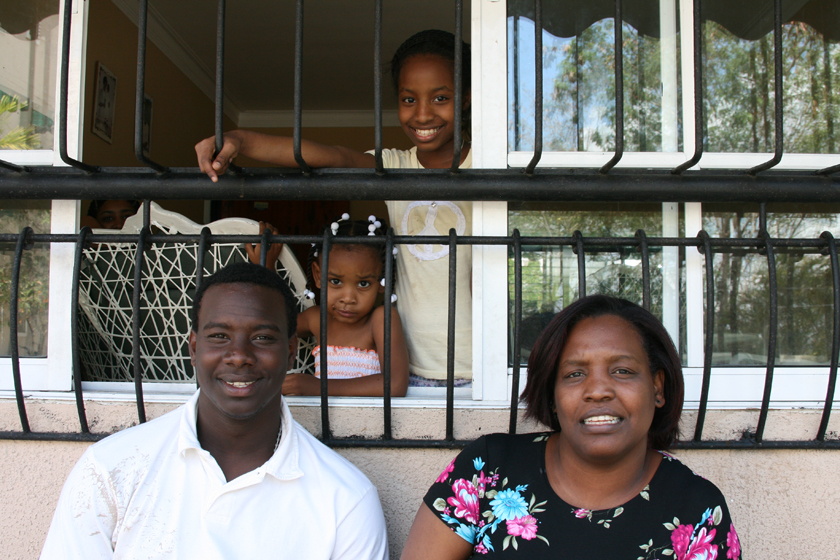By Robyn Fieser
At 6 feet 3 inches tall and 200 pounds, Felix Antonio Sterling looks like a bear, but acts like a kid. He cruises the streets of his neighborhood in Santo Domingo, Dominican Republic, honking his horn, waving nonchalantly to friends, as he shows off the booming speaker system he installed in his first car -- a used Mitsubishi SUV. He spends hours playing video games. He prefers fast food to a sit-down meal and he socializes through Facebook.

Felix, 18, with his mother, Matty, and sisters at the Dominican Republic apartment he bought for them with his first signing bonus from the Cleveland Indians. Photo by Robyn Fieser/CRS
In most ways, he's like any other 18-year-old, except most kids his age don't consider themselves the father of their family -- and few can throw a baseball 95 miles per hour.
It's his arm that caught the eye of scouts for the Cleveland Indians. They offered a minor league baseball contract to this kid who once spent more time on the street than he did at school or on the playing field.
The self-proclaimed rebel knows he was once headed for jail rather than the lush grasses of the Indian's minor league training facility in Goodyear, Arizona. He'll start his second season of professional baseball there this month.
And he has the people at the Hogar Acogido Quédate Con Nosotros -- a Spanish phrase meaning "Foster Home, Come Stay With Us" -- to thank for it. "Without them, I would never have become a professional," says Felix. "They taught me that everything in life has rules."
'Wherever I Was, I Was Fighting'
The Hogar, run by the Salesians of Don Bosco order, is one of five partners working with CRS to take care of street kids in the Dominican Republic. Felix landed at the Hogar at age 11 after getting into yet another fight and harassing an elderly neighbor.
"I just couldn't take it anymore," says his mother, Matty, standing proudly in the new apartment Felix bought for her and his two sisters with his signing bonus.
Even at that age, Felix was huge. And he was angry. "I always wanted to fight," he says. "Every day, at school, wherever I was, I was fighting."
Family members say that he was a brute because "he thought that nobody loved him," says Matty.
There was some abuse at home, but Felix falls quiet when the subject comes up. His father is a stranger to him. He's met him, but doesn't know where he lives or what he does. Still, it was hard to tell exactly why Felix was so angry.
Family Helped the Healing Process
Inevitably, his propensity for hooliganism sent him down a troubled path. Frequently alone in the two-room apartment he shared with his family, he roamed the streets, throwing rocks at guards who watched over the neighborhood.
"At the rate I was I going, I was probably -- like my grandfather said -- going to end up like some of my friends. Some of them are in prison, some of them are on the street, others are in the hospital," he says.
To get him on track, a team at the Hogar walked him through therapy and slowly brought in most of Felix's family -- his grandparents, his mother and his uncle, with whom Felix had a volatile relationship.
By involving relatives, the program builds family support for kids. For Felix, that support helped him heal psychological wounds and bolstered his self-esteem. His counselor even made house calls when Felix was home for the weekend and had minor relapses.
"They work with you until you learn. They understand you when you complain or need to talk about something, and they always point out when you're acting badly," says Felix.
With the foundation in place, Felix returned to school and, eventually, home, where things were calmer.
Blazing Fastball Attracts Scouts
At age 13, he wanted to try his hand at sports. His first choice was soccer, but his stocky build led his grandfather and school counselors to suggest baseball, which has sent Dominican athletes to play professionally in the United States.
A naturally gifted athlete, Felix soon found himself on a team on the strength of his right arm. He was pitching for less than a year when he caught the eye of scouts from the Indians.
Now, with only one season of rookie league professional baseball under his belt, Felix was named the 16th best prospect in the entire Indians organization, according to Indians Prospect Insider, a website that rates the organization's minor leaguers.
He's throwing at 95 miles per hour on the radar gun with his fastball, and he's sure it will only get better.
"I'm still young, so depending on how I develop, I could reach 100 [mph]," he says.
Signing Bonus Earmarked for Education
He's confident too that he'll reach the major leagues, a dream not uncommon in this country, where kids in baseball caps and tube socks run drills in public parks.
"As long as God gives me my health, I know I can," he says.
He has to, he adds, because he his family depends on him. "I'm the papi [daddy] of the entire family," he says.
With the next signing bonus, Felix plans to pay for his sisters' education. Meanwhile, he has never forgotten the education he received at the Hogar. He visits when he's back in town. Sometimes he talks to the kids.
"A lot of them say, 'I want to be the same as you,' and I tell them, 'Look, do what the counselors tells you to do, and you will be the same as me.' "
Robyn Fieser is CRS's regional information officer for Latin America and the Caribbean. She is based in Santo Domingo, Dominican Republic.
